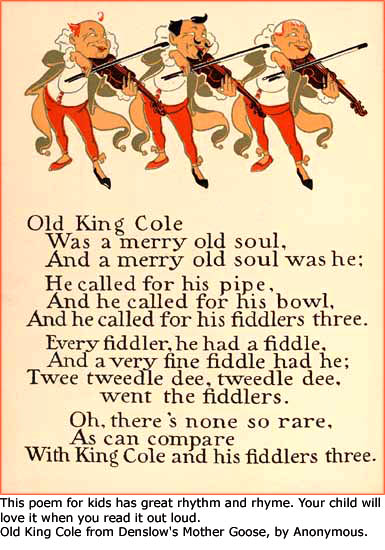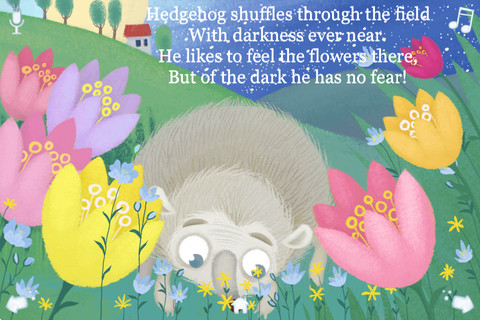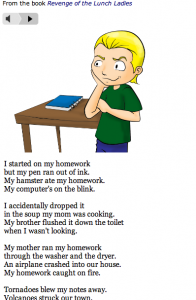Fun Poems For Kids Biography
Source(google.com.pk)
You Can Do It
I promise you, you can write wonderful, exciting, funny poetry that will amaze your parents and teachers, and have your friends falling down laughing. Everything you need, except for a pencil and a piece of paper, is in this book right here in your hands. I know you don’t believe me yet, but keep reading and I will show you lots of simple methods you can use to create your own original, hilarious poetry. You will soon find it is simpler than you thought and people are going to wonder how you got so talented.
Getting Started
Maybe you have thought about writing poetry, but don’t know how to get started. Or maybe you are already writing poetry, but want to learn how to make it better. Whatever your reasons for picking up this book, get ready to have some fun! Just by reading a few chapters in this book, you will be able to write funny, exciting poetry. By learning a few specific tricks and techniques, you will soon be amazed at your own poetic skill. Most importantly, you will have a lot of fun doing it.
But what if you fail? What if you find can’t write poetry? Or worse, what if you write a poem and someone tells you it isn’t any good? I swear to you, cross my heart, if you can read this book, you can write poetry. In fact, you will soon find that it is nearly impossible to fail. I say “nearly” because there is really only one way you can fail when it comes to writing poetry: to not write at all. If you have written a poem, you have succeeded, even if someone else tells you they don’t like it.
Let me give you an example. If you want to be a runner, you don’t run a four-minute mile the first time you try. Even if it takes you 20 minutes to run a mile the first time you try,you will have succeeded if you complete the goal you set for yourself. If someone tells you, “you’ll never be a runner because it took you 20 minutes to run a mile”, pay no attention. Just run another mile and another. Soon you’ll be running 15-minute miles, and 10-minute miles, and 8-minute miles, and faster.
Writing poetry works the same way. Each time you do it, you get a little bit better. If someone tells you “your poem isn’t any good”, pay no attention. Each poem you write makes you a better poet. If you write a new poem every day for a month, you will be a better poet at the end of the month than you were when you started.
TIP: You become a good poet by writing lots of poems. Each time you write a new poem, try to make it as good as you can and your skill will improve with each poem you write.
The reason that you become a better poet by writing poems is because, no matter what skill you want to learn, you always “learn by doing”. After you have written your first poem, you will know something that you did not know before, even if it is just that you can write poetry. After you have written your second or third poem, you will know even more, perhaps you will have learned something about rhyming or the rhythm of poetry. By the time you have written twenty or thirty poems, you will find it both easy and enjoyable.
At each step of the way, I will be here to guide you. I will be with you on each page of this book to show you how to make people laugh and enjoy your poetry. I will give you the tools and the knowledge you need to make your poems as good as they can be. Although this book contains a fair bit of “technical” information about poetry, I have tried my best to make it as easy to understand and fun to learn as possible. I have also included plenty of helpful tips, examples, and fun exercises to help you learn to write your own original funny poems. All you need to do is open this book to any chapter and start reading.
In this first chapter, I show you how to get started writing poetry and offer some general advice for the new poet.
What “Tools” Will You Need?
As with any hobbies or sports you might enjoy, writing poetry requires a bit of special equipment. Fortunately, it does not require any protective clothing such as helmets or kneepads, and is not generally considered to be dangerous. All you really need is a pencil and a piece of paper. Though a pencil and paper are the only things required, if you are serious about writing poetry, there are a couple more things you should have.
THE IMPORTANCE OF A NOTEBOOK
The most important tool you should have as a poet is a small notebook, preferably one that fits in your pocket, that you can carry with you everywhere you go. You never know when an idea will come to you, and if you don’t write it down, it is likely you will forget it. By carrying a notebook with you at all times, you can write down your ideas immediately when they come to you so that you don’t forget them.
Some poets prefer to use a “journal”, which is like a book with blank pages that you can write whatever you want in. A journal is sort of like a diary, except that it doesn’t have pages for each day of the year. Instead, you can organize it any way you like. Personally, I prefer a pocket notebook because it is easier to carry. But you should use whichever feels more comfortable to you.
So go get yourself a small notebook or a journal and start writing down ideas. When you write down an idea, it doesn’t have to be an entire poem. An idea can be as simple as noticing a fun rhyme and writing it down to use it later. In my notebook, I often write down single words that I think are funny or interesting, such as “linoleum” or “Bermuda” because I like the way they sound and I think they might be useful in a poem later.
Don’t worry about neatness. Be as messy as you want and don’t worry about spelling or punctuation. The only thing that matters is that you capture ideas as them come to you by saving them in your notebook or journal.
You can also use your notebook to write entire poems, or to start poems that you can finish later. Sometimes I will write down a single line that I think might make a good first line of a poem, like “The fish in our aquarium are looking rather sad” or “The pumpkin and the ladybug were drifting on the sea”. Sometimes I may write a verse that I think of that is not a complete poem, such as “I think my brain is wearing out, from working much to hard, and now it’s just as useful as a bucketful of lard” or “Molly McDoon was a purple balloon, who floated all morning and all afternoon.” Someday I may take these “starters” and write entire poems from them.
TIP: A notebook you can carry with you all the time is your most important tool for writing poetry. Take it with you everywhere you go, and always try to remember to write your ideas down when they come to you.
OTHER “TOOLS OF THE TRADE”
The serious (or not-so-serious) poet has several other tools in his or her arsenal in addition to pencil and paper. These include a rhyming dictionary, a standard dictionary and a thesaurus.
TIP: The only tools you really need to write poems are a pencil and paper, and your brain. But writing poetry can be even easier if you have a rhyming dictionary, a dictionary and a thesaurus.
RHYMING DICTIONARY
The most important of these is probably the rhyming dictionary. If you have never seen a rhyming dictionary, it is a book that lists the words that rhyme with end sounds of other words. For example, if you want to find a rhyme for “cat”, you would look up “at” in a rhyming dictionary, because “at” is the ending sound of the word “cat”. The rhyming dictionary would give you a list of words, including “at”, “bat”, “cat”, “fat” and so on.
My personal favorite paperback rhyming dictionary is the Complete Rhyming Dictionary by Clement Wood. If you do not already own a rhyming dictionary, I recommend you consider adding a copy of this book to your library.
Although paperback rhyming dictionaries are handy when you are away from a computer, rhyming dictionary software is easier to use and far more useful. My favorite rhyming dictionary software is called Rhymesaurus, and you’ll find it here:
Purple Room Publishing
In addition, there are several online rhyming dictionaries. Here are a couple of the best:
Poetry4kids.com Online Rhyming Dictionary
RhymeZone Online Rhyming Dictionary
DICTIONARY
In addition to a rhyming dictionary, you should also have a regular dictionary and a thesaurus. If you do not already have a dictionary, my personal favorite dictionary is the hardback “college edition” of Webster’s New World Dictionary, published by Simon and Schuster.
In my opinion, dictionaries are not all created equal. Some dictionaries are better than others in terms of word selection, clarity of definitions, and so on. If you don’t believe me, or if you just want to prove it to yourself, go to the library and get several dictionaries from the reference section. Now look up the same word in each dictionary and see how the definitions are organized and written. You may find you have a favorite as well. If this seems like too much trouble to you, just take my advice and get yourself a copy of the Webster’s New World Dictionary. Make sure it’s the hardback “college edition” and not the paperback version, which is a smaller, more concise edition.
Just as there are rhyming dictionaries on the Internet, there are also several standard dictionaries on the Internet. The easiest one to remember is “dictionary.com” at http://www.dictionary.com. However, I usually use Merriam-Webster’s online dictionary at http://www.m-w.com, as it is a more modern and more complete dictionary.
THESAURUS
Finally, the last tool that every poet should have in his or her toolbox is a good thesaurus. A thesaurus is a “dictionary of synonyms and antonyms”, allowing you to easily find words that “mean the same thing” or the opposite of a given word. Often I use a thesaurus to help me find words to use in my poems. For example, in the following poem, I looked up the word “detective” in my thesaurus and came up with several synonyms, including “private eye”, “spy”, “Pinkerton”, “gumshoe” and “sleuth”.
Fun Poems For Kids Poems For Kids About School That Rhyme Shel Silverstein in English To Recite About Friends in Urdu About Friendship

Fun Poems For Kids Poems For Kids About School That Rhyme Shel Silverstein in English To Recite About Friends in Urdu About Friendship

Fun Poems For Kids Poems For Kids About School That Rhyme Shel Silverstein in English To Recite About Friends in Urdu About Friendship

Fun Poems For Kids Poems For Kids About School That Rhyme Shel Silverstein in English To Recite About Friends in Urdu About Friendship
Fun Poems For Kids Poems For Kids About School That Rhyme Shel Silverstein in English To Recite About Friends in Urdu About Friendship

Fun Poems For Kids Poems For Kids About School That Rhyme Shel Silverstein in English To Recite About Friends in Urdu About Friendship

Fun Poems For Kids Poems For Kids About School That Rhyme Shel Silverstein in English To Recite About Friends in Urdu About Friendship
Fun Poems For Kids Poems For Kids About School That Rhyme Shel Silverstein in English To Recite About Friends in Urdu About Friendship

Fun Poems For Kids Poems For Kids About School That Rhyme Shel Silverstein in English To Recite About Friends in Urdu About Friendship

Fun Poems For Kids Poems For Kids About School That Rhyme Shel Silverstein in English To Recite About Friends in Urdu About Friendship


No comments:
Post a Comment